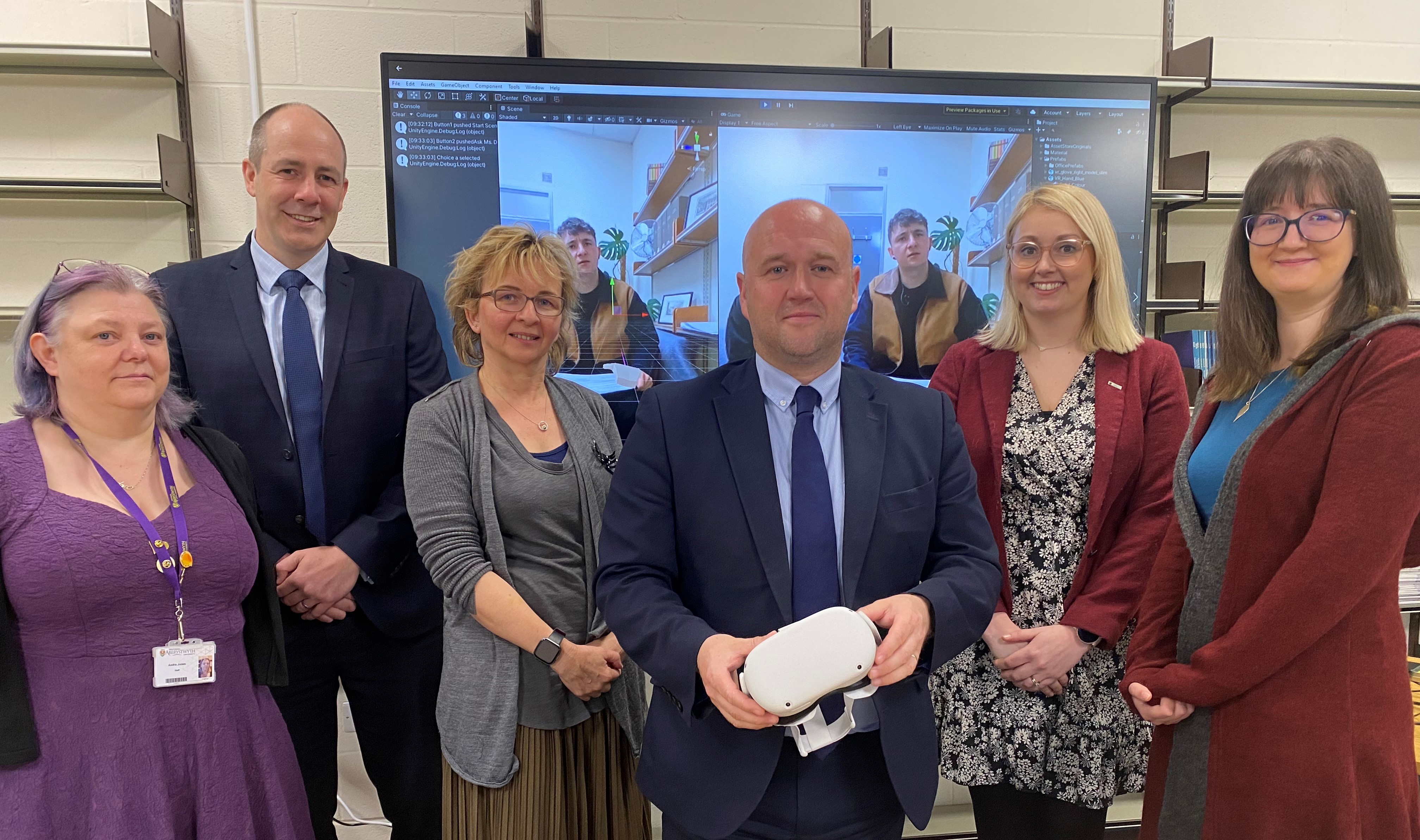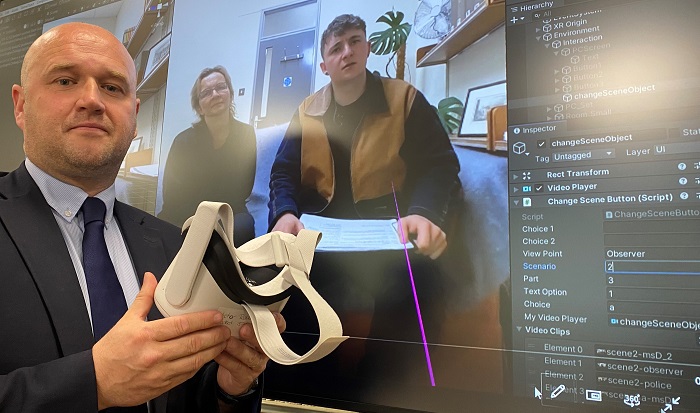‘Through the eyes of older victim-survivors’ How virtual reality can improve practitioner responses to trauma

Left to right: Andra Jones, Department of Computer Science at Aberystwyth University; Detective Chief Inspector Richard Yelland, Dyfed Powys Police; Sarah Wydall, Dewis Choice at Aberystwyth University; Dafydd Llywelyn, Police and Crime Commissioner for Dyfed-Powys; Rebecca Zerk, Dewis Choice at Aberystwyth University; Dr Helen Miles, Department of Computer Science at Aberystwyth University.
13 June 2022
Police officers and specialists in domestic abuse and health have been using the latest virtual reality technology to experience exactly how people may feel when disclosing violence and abuse, thanks to research at Aberystwyth University.
Dr Helen Miles and Andra Jones from the Department of Computer Science, who specialise in virtual environments and virtual reality, have teamed up with Rebecca Zerk, Sarah Wydall and Elize Freeman from the Centre for Age, Gender and Social Justice to pioneer a prototype training tool thanks to Welsh Government-funded research.
“Many people will think of virtual reality as a form of entertainment”, said Helen Miles, Principal Investigator, “but the potential is so much greater: this technology offers a unique way to see the world through the eyes of someone else, allowing us to experience situations we may never experience in reality.”
The pilot, titled ‘Through their eyes: The virtual help-seeking experience of an older victim-survivor of domestic abuse’, was funded by Welsh Government through the Wales Data Nation Accelerator (WDNA) Super-Sprint.
The team worked with older victim-survivors, and partners from the Mid and West Wales Violence against Women, Domestic Abuse and Sexual Violence Network (VAWDASV) and Independent Domestic Violence Advisors (IDVAs) to co-develop the prototype virtual reality (VR) experience as a training tool to allow partners to see things from the perspective of an older woman making a disclosure of domestic violence and abuse.
Sarah Wydall is the Principal Investigator on Dewis Choice, based at the Centre for Age Gender and Social Justice. Sarah explains: “Through the VR headset, participants were able to take part in an immersive encounter depicting the initial police response at the home of an older victim-survivor of domestic violence and abuse.
“At various points during the scenario, the viewer was invited to make a choice about the direction of the help-seeking and safeguarding options presented. Their chosen response would lead to one of eight different pathways and possible outcomes”.
Rebecca Zerk the co-investigator added: “In this way, the VR experience demonstrated to participants how their behaviour and response to somebody making a disclosure of domestic violence and abuse, can influence the nature, direction and outcome at different stages in the help-seeking journey.”
As part of the pilot study, thirteen practitioners including police officers and specialist domestic abuse leads evaluated the impact of this immersive VR experience to give their perspective on whether it increased empathy and sensitivity to victim-survivors, and identify development opportunities.
Rebecca Zerk continues: “VR is known to have the potential to elicit deeper feelings of empathy, and the response from practitioners who evaluated the use of it as a training tool were positive. Evaluators commented on the level of realism and emotional investment in the scenario portrayed, and the beneficial impact of the VR approach as a pedagogic tool.”
One of the partners on the project was Detective Chief Inspector Richard Yelland from Dyfed Powys Police, who said: “Traditional police training has for many years been successful in providing frontline officers with a knowledge base required to respond to domestic abuse incidents. This traditional method fails in providing new recruits a real sense of dealing with a victim, and more experienced officers the knowledge to overcome officer norms whilst re-establishing victim empathy.
“The Virtual Reality training tool provided me with an experience I have not felt during any of my 21 years in policing. The device was simple to use and I felt completely immersed in the scenario. The ability to see through the eyes of a survivor really challenged my extensive experience in dealing with cases of domestic abuse. This technology is a must in the future of police training.”
Another of the project partners was Regional Violence against Women, Domestic Abuse and Sexual Violence lead, Natalie Hancock, who found the use of VR to be refreshing and innovative, and felt it provided an impactful alternative to traditional methods of case studies and role-play training techniques: “I have been fortunate enough to use the tool, my first-time using VR technology, and found it very simple to use and each perspective incredibly insightful. This enables the tool to be versatile in application and can be aimed at professionals with differing levels of experience and roles in response to Violence against Women, Domestic Abuse and Sexual Violence.
“It is also very useful in challenging practitioners who may have lost empathy and become desensitised to the experience of victims. This tool allows individuals to experience the approach of practitioners from other perspectives, allowing them to reflect on their current practice.”
The Minister for Education and Welsh Language, Jeremy Miles said: “This innovative project from Aberystwyth University shows just how much impact higher education research can have on people’s lives. I’m proud that Welsh Government funding through WDNA has helped make this a reality.”
Following the successful pilot study, the project team hopes to secure further funding to carry out a larger-scale study of the use of VR technology to help practitioners to best understand and support help-seekers of domestic violence and abuse.

Dafydd Llywelyn, Police and Crime Commissioner for Dyfed-Powys, tries out the ‘Through their eyes’ prototype VR experience during his visit to the Dewis/Choice Initiative



